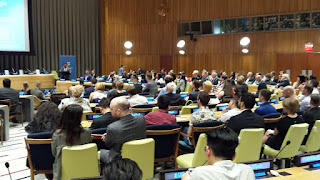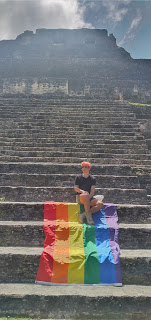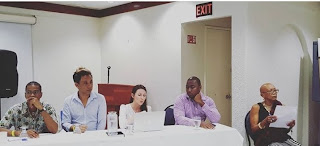The African revolution begins with gay rights
Africa has however managed to inspire the homosexuality debate world
over. In the recent House of Commons debate on the UK Marriage (Same Sex
Couples) Bill, a member called upon the house to vote for the bill
because of Africa rather than vote against it for the same reason. While
in all other international discourses Africa has been ignored or
referred to only as a place that needs ‘help’ other than a continent
that brings something to the world table, the debate on homosexuality
cannot be complete without Africa. In this debate, unlike those on
hunger, disease and other afflictions that have cowered Africans into
complacent people who cannot stand up to their rogue governments,
Africa’s resilience shines.
In spite brutal crack downs on gay rights on the continent, this minority group continues to give African leaders sleepless nights. On the face of it, it is hard to imagine why anyone's sexual life should cause unease to leaders who live in cushioned mansions, travel in private jets and, when they happen to use the pot-hole infested roads, drive in military-size cars with dark tinted windows. But the truth is that these leaders know that a triumph for gay rights - the most controversial human right on the continent - is a triumph for every other human right; civil, political, economic, and social.
Gay rights activists in Uganda are not just content to sit and mourn about the tribulations of being gay in Africa. They are very interested in the entire political situation in the country, using social media to start discourses on a various topics from the fleeing Ugandan general, the recent oil discoveries to the Christian martyr’s celebrations. Maybe because they know what it feels like to be alienated, the Ugandan gay community is quite welcoming and warm and they have a real concern not just for their future but for the future of the continent. Unlike heterosexuals who enjoy a semblance of human rights and dignity, homosexuals have already had a feel of what it is like to be under a government that hates you. They know that inevitably, the long serving African dictatorships will turn against their people and they too will have to closet their ideas, their demands for fairness and equality, for another day.
The writings are already on the wall; one day a British playwright is stopped from staging a play perceived to promote homosexuality; the next media houses are closed down for publishing stories deemed prejudicial to national security.
The debate on homosexuality has managed to reveal African leaders for who they really are. In Uganda, the Ethics Minister Simon Lokodo, one of the most vocal proponents of the anti-homosexuality bill, also said that it is natural to rape women. Member of Parliament Odonga Otto, another vocal anti-gay campaigner who said he would kill his child if the child was gay, was involved in a scandal where he forged documents to try and steal his own children out of his wife’s custody. Speaker Rebecca Kadaga, shortly after promising Ugandans the anti-homosexuality bill as a Christmas present threw out journalists for covering parliament affairs in a way that displeased her. Zimbabwe’s Robert Mugabe cracked down homosexuals and his country.
When it comes to homosexuality, these are the same people who stand on the roof and preach the gospel of morality and doing what is right and proper in society. The same people who applauded their anti-homosexuality stop to question some of these decisions. The people may not understand the principle of indivisibility of human rights, but it is plain to see that intolerance to one group leads to intolerance of another- Similarly, recognising the rights of one group means recognising the rights of others. African leaders thus know that if they are to survive, they need to crack down on anything that challenges the status quo and nothing does so more than homosexuality.
But the gay rights movement in Africa is not just standing back and letting the government have its way. In seven years, the gay community in Uganda has taken three cases in defence of their rights to court. Two of them were decided in their favour- With the courts holding that like any other Ugandan; they have the right to privacy, equality and human dignity. With these pro-gay rights precedents, the gay community is almost certain that the increasingly progressive Ugandan judiciary will uphold their right to freedom of expression and assembly as gay people. In South Africa, Minister of Home Affairs v Fourie decision made the country the fifth in the world to legalise gay marriage. With these baby steps, Africa is defying the stereotype of being altogether homophobic.
Undoubtedly, the terrain is still rough for homosexuals in Africa. The terrain is rough for Africa in general. Curtailing of human rights by African leaders has been a song for decades, but the gay rights movement in Africa is determined to play another tune.
Patience Akumu is a Features writer with the Observer newspaper in Uganda. She is the winner of the David Astor Journalism Award 2013 and is on a fellowship programme with The Independent
Source:http://www.independent.co.uk/voices/comment/the-african-revolution-begins-with-gay-rights-8651021.html
In spite brutal crack downs on gay rights on the continent, this minority group continues to give African leaders sleepless nights. On the face of it, it is hard to imagine why anyone's sexual life should cause unease to leaders who live in cushioned mansions, travel in private jets and, when they happen to use the pot-hole infested roads, drive in military-size cars with dark tinted windows. But the truth is that these leaders know that a triumph for gay rights - the most controversial human right on the continent - is a triumph for every other human right; civil, political, economic, and social.
Gay rights activists in Uganda are not just content to sit and mourn about the tribulations of being gay in Africa. They are very interested in the entire political situation in the country, using social media to start discourses on a various topics from the fleeing Ugandan general, the recent oil discoveries to the Christian martyr’s celebrations. Maybe because they know what it feels like to be alienated, the Ugandan gay community is quite welcoming and warm and they have a real concern not just for their future but for the future of the continent. Unlike heterosexuals who enjoy a semblance of human rights and dignity, homosexuals have already had a feel of what it is like to be under a government that hates you. They know that inevitably, the long serving African dictatorships will turn against their people and they too will have to closet their ideas, their demands for fairness and equality, for another day.
The writings are already on the wall; one day a British playwright is stopped from staging a play perceived to promote homosexuality; the next media houses are closed down for publishing stories deemed prejudicial to national security.
The debate on homosexuality has managed to reveal African leaders for who they really are. In Uganda, the Ethics Minister Simon Lokodo, one of the most vocal proponents of the anti-homosexuality bill, also said that it is natural to rape women. Member of Parliament Odonga Otto, another vocal anti-gay campaigner who said he would kill his child if the child was gay, was involved in a scandal where he forged documents to try and steal his own children out of his wife’s custody. Speaker Rebecca Kadaga, shortly after promising Ugandans the anti-homosexuality bill as a Christmas present threw out journalists for covering parliament affairs in a way that displeased her. Zimbabwe’s Robert Mugabe cracked down homosexuals and his country.
When it comes to homosexuality, these are the same people who stand on the roof and preach the gospel of morality and doing what is right and proper in society. The same people who applauded their anti-homosexuality stop to question some of these decisions. The people may not understand the principle of indivisibility of human rights, but it is plain to see that intolerance to one group leads to intolerance of another- Similarly, recognising the rights of one group means recognising the rights of others. African leaders thus know that if they are to survive, they need to crack down on anything that challenges the status quo and nothing does so more than homosexuality.
But the gay rights movement in Africa is not just standing back and letting the government have its way. In seven years, the gay community in Uganda has taken three cases in defence of their rights to court. Two of them were decided in their favour- With the courts holding that like any other Ugandan; they have the right to privacy, equality and human dignity. With these pro-gay rights precedents, the gay community is almost certain that the increasingly progressive Ugandan judiciary will uphold their right to freedom of expression and assembly as gay people. In South Africa, Minister of Home Affairs v Fourie decision made the country the fifth in the world to legalise gay marriage. With these baby steps, Africa is defying the stereotype of being altogether homophobic.
Undoubtedly, the terrain is still rough for homosexuals in Africa. The terrain is rough for Africa in general. Curtailing of human rights by African leaders has been a song for decades, but the gay rights movement in Africa is determined to play another tune.
Patience Akumu is a Features writer with the Observer newspaper in Uganda. She is the winner of the David Astor Journalism Award 2013 and is on a fellowship programme with The Independent
Source:http://www.independent.co.uk/voices/comment/the-african-revolution-begins-with-gay-rights-8651021.html



Comments
Post a Comment